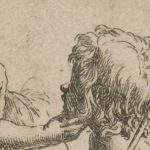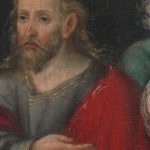July 16, 2018
Year 3, Day 197
As a lad in elementary and high school, I took different kinds of jobs, as permitted for the times during the 1930s, the Great Depression years. One of those jobs was as a paper boy peddling newspapers to customers, selling extras on the street, and managing the little money that came from hours devoted to subscribers. Newspapers were three cents each, and I received a penny from each cash sale. Subscribers paid twenty cents weekly, for seven days delivery. I received six of the twenty. I learned to like and read newspapers, graduating gradually from the funnies to the front page as well as editorials and sports pages. I remember well the day Billy Sunday died, and the small squib… Read more
May 28, 2018
Year 3, Day 148
For illness and health, there are false representations as there are for nearly everything else with which we have to do. There are false problems, false cures, even real problems confounded or cured by false or contradicting procedures. Medical research often includes placebos in testing the efficacy of whatever medication they are trying to prove effective for purpose. These are sometimes called sugar pills (placebos), even when they may have no sweetener in them. The researcher is aware that a percentage of his research subjects will do just as well, and sometimes better, with a medication that means nothing to the disease that is under study related to the sample participants. Laypersons may be less perplexed by all this than… Read more
May 18, 2018
Year 3, Day 138
The Old Testament accents common grace: the New Testament divine grace. Common grace is managed by law as indicated in the code proposed by Moses to Israel, and from the model of Israel and the clarity of Scripture to the world. Through model (life experience) and language (human communication) God reveals himself in his divine nature and reveals mankind in mortal/spiritual nature. Scripture makes clear that God will not, indeed cannot, accept to his kingdom any life that violates his standard of holiness. From a truncated story of the initial creative years related to animal life, and human life in particular, the information proceeds to declare that to the animal (mankind) he gave a special added factor noted as his… Read more
May 12, 2018
Year 3, Day 132
Change is a recurring theme in these Pages because it is important to the understanding of so many other factors related to the course of life. Further, it is met with contradictory attitudes by both those who like change and those who do not. Infants and small children often perceive change and new experiences as threatening. We feel protective of them when they react to new contexts. They find comfort and safety in their parents or siblings who provide a sense of safety for them. Elders do not take change quite so personally, having had experience, and having been a part of change earlier that may be in the process of change again in their elder years. Often agents of… Read more
April 19, 2018
Year 3, Day 109
Contradiction and paradox make up an important interest for me – high interest. In my view the wise person does not sift through the issues of life and faith without finding some way to manage contradiction and paradox. They contain some secrets to understanding how to balance life and understanding, in both theory and reality. I wonder about the wisdom views of Solomon and the contradictions of his life. I wonder about how Peter could walk with Christ for a thousand days, and deny him, swearing, at the fire near the site of Christ’s crucifixion. I wonder about Demas, so important to the ministry of the Apostle Paul, abandoning the Apostle, but seeming to recover later. I wonder about the contradictions… Read more
March 20, 2018
Year 3, Day 79
Early in the life of the Church (spiritual), following the Ascension of Jesus, the Apostles remained together as a group, in Jerusalem, launching the ministry of Christ to go into the world and preach the gospel. They later dispersed in the various directions of the compass to do what they could in the rapidly expanding church movement (institutional). Samaria, formerly shunned by Jews, received the gospel. The Apostles sent Peter and John to minister abroad and organize appropriately. Paul launched world ministry. Proof of the need for such oversight came quickly with Simon, a magician highly profiled because of the tricks of his trade. They seemed to give credence to his extravagant claims of his own authority. However, the message… Read more
January 6, 2018
Year 3, Day 6
If Scripture is true in its story of the redemption of human beings in the provision of God through Jesus Christ, and its application to the human experience, it becomes a matter of primary importance that a person determine to follow that challenge for faith. There is no middle ground in that there is offered no middle ground. Christianity demands a verdict. In this, God appears to make clear that his own freedom for decision and action is a part of the image of God given to us. That freedom is illustrated in many ways in the context of mankind, but none as formidable and important as the decision to limit one’s self to the plan of God that changes… Read more
December 11, 2017
Year 2, Day 345
Who among us in the population are Christians? The range of concepts and claims is mind-boggling. Those who do not claim personal relationship with Christ may be better oriented for their non-Christian orientation than some of the Christian population seem to be about Christian faith. This stew of many persons claiming Christianity is likely due to limited knowledge of the content of Scripture; to our tendency to shift meanings of anything to fit our own designs; to various cultural evolvements that include pagan concepts; and, to intellectual adjustments about matters of faith. This list can be extended. I read of persons who want to be included as Christian in society in the implication that there is a personal commitment of… Read more
October 2, 2017
Year 2, Day 275
I am surprised that this verse gains so little attention from Christian apologists. It is an argument for peace. It has been my purpose to retain the verse for this date through the volumes of daily devotional/educational Pages looking toward a mature, practical, and satisfying Christian life and culture – especially so as to engage thought of life experience for readers. I am here engaging Christian collegians, and my family’s emerging generations, in a context I believe served me after a lifetime of study, (both secular and biblical) – travel of the world; family experience to nearly five generations; counseling for years as well as being counseled; and, engaging persons (some eminent), who I believe were both poorly and well-conditioned… Read more
August 11, 2017
Year 2, Day 223
Some studies have shown that ministers are more satisfied with their professional lives than any other group. In 2010, a year of relatively high unemployment in America, a careful poll showed that with all the problems, and with lower income than others holding equivalent educations, the pastors across all lines of demarcation were the most pleased with their work. All categories were well represented. Information appeared in news programs. (Response was the same in England.) (CBS – WCCO on 8/10-11/2010) The poll dealt with satisfaction, not stress. For example, firefighters were found to be highly satisfied with their jobs, but also under high stress. Surgeons and other health services found high stress. Servers, like waiters and bartenders, were least satisfied… Read more






